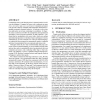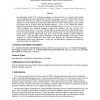499 search results - page 87 / 100 » Search Engines that Learn from Implicit Feedback |
AIRWEB
2009
Springer
15 years 5 months ago
2009
Springer
Web spamming techniques aim to achieve undeserved rankings in search results. Research has been widely conducted on identifying such spam and neutralizing its influence. However,...
101
click to vote
CLEF
2009
Springer
15 years 6 days ago
2009
Springer
This paper describes the participation of LIG lab, in the batch filtering task for the INFILE (INformation FILtering Evaluation) campaign of CLEF 2009. As opposed to the online ta...
101
Voted
JCDL
2010
ACM
15 years 1 months ago
2010
ACM
In search engines, ranking algorithms measure the importance and relevance of documents mainly based on the contents and relationships between documents. User attributes are usual...
101
click to vote
SOSP
2007
ACM
15 years 8 months ago
2007
ACM
Commenting source code has long been a common practice in software development. Compared to source code, comments are more direct, descriptive and easy-to-understand. Comments and...
108
click to vote
CLEF
2007
Springer
15 years 5 months ago
2007
Springer
In participating in this CLEF evaluation campaign, our first objective is to propose and evaluate various indexing and search strategies for the Russian language, in order to obta...


